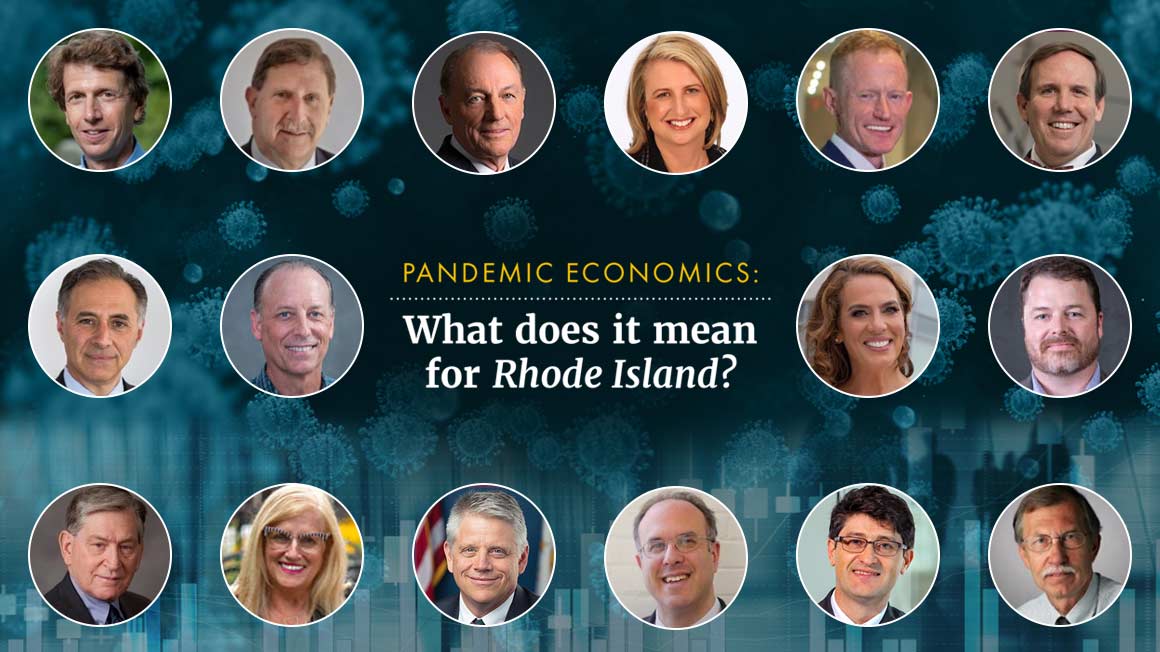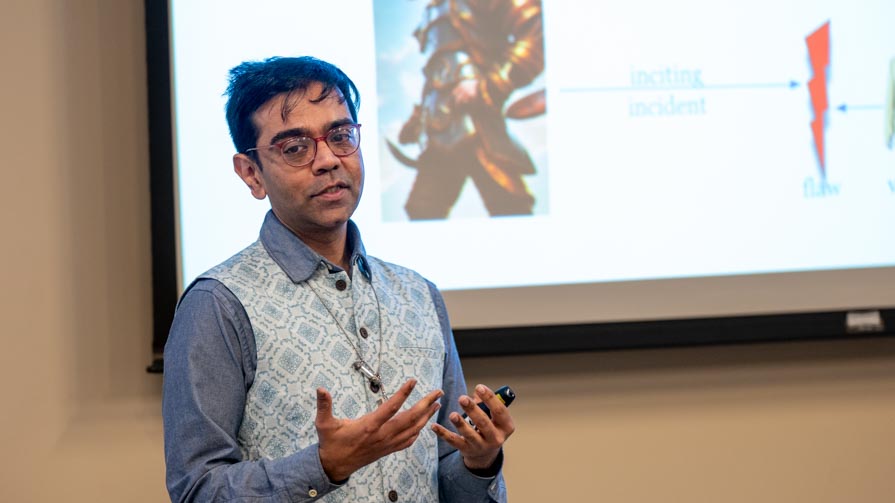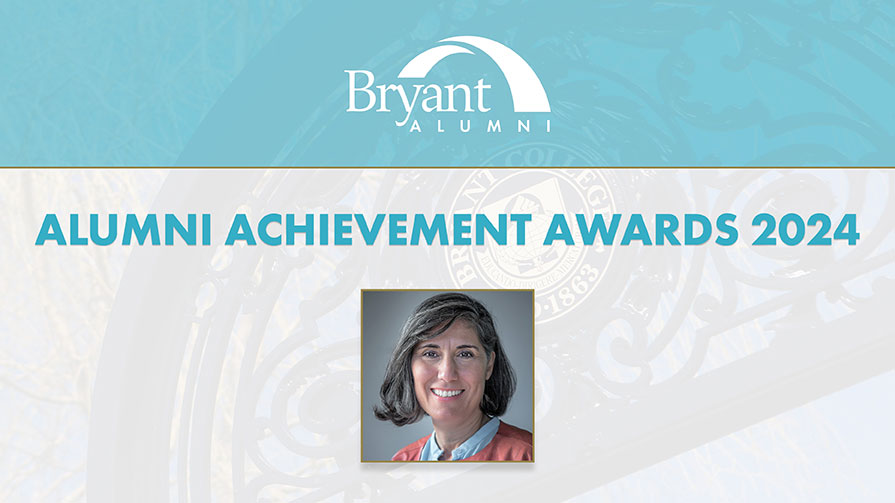SMITHFIELD, RI - The virtual panel series “Pandemic Economics: What does it mean for RI?” concluded on June 8 with a look at “Jobs and Sectoral Changes.” This was the third and final panel in the series, presented by Bryant University and the Rhode Island Foundation, to help Rhode Islanders better understand the economic impact of COVID-19 and how the state can move toward recovery and growth for all.
“With so many individuals and businesses in Rhode Island struggling, and growing unemployment, it is critically important for state leaders to pull together and find innovative ways to move the state through this crisis and beyond,” said Rhode Island Foundation President and CEO Neil D. Steinberg.
Each panel discussion was recorded and is available at the links below.
- A Time for Strategic Leadership
- COVID-19: Public Finances in Rhode Island
- COVID-19: Jobs and Sectoral Changes
A summary of key takeaways from the series is also available at the end of this article.
“Bryant is very much focused on contributing to making Rhode Island a better place."
Hosted by Bryant’s incoming President Ross Gittell, Ph.D., a renowned economist, the Jobs panel highlighted the common themes of education, innovation, and partnerships as critical to the state’s recovery and growth moving forward. “Bryant is very much focused on contributing to making Rhode Island a better place, particularly coming out of this difficult economic time,” said Gittell.
John Kostrzewa, former Business Editor, Providence Journal; Adjunct Professor, English and Cultural Studies, Bryant University, led the informative and important discussion on jobs and sectoral changes with distinguished panelists Scott R. Jensen, Director, Rhode Island Department of Labor and Training (DLT); Edinaldo Tebaldi, Ph.D., Professor of Economics, Bryant University; Laurie White, President, Greater Providence Chamber of Commerce; Dale Venturini, President and CEO, Rhode Island Hospitality Association.
The employment landscape
In his presentation of key economic data for Rhode Island, Tebaldi, co-chair of the Pandemic Economics series, said that the fundamental principles for recovery moving forward are “investment in capabilities and diversifying the employment base, as well as education, infrastructure, and technical innovation."
The fundamental principles for recovery moving forward are “investment in capabilities and diversifying the employment base, as well as education, infrastructure, and technical innovation."
All of the panelists highlighted education and training as a critical component of the state’s recovery and building capacity for innovation. Through programs like Real Jobs RI, created by Scott Jensen and his team at DLT, more Rhode Islanders are gaining access and opportunities to learn new skills for the future.
“If we can put people who have the right kind of strengths, and the right kind of skills in industries where those skills can be really made use of, that's how we're going to…give our Rhode Island companies the practical advantages in the marketplace that they're going to need to survive and thrive,” said Jensen.
Dale Venturini, CEO of Rhode Island’s Hospitality Association, echoed the need for education and training to help individuals in the hospitality and tourism industry get back to work. The key to success, she said, is “building a culture of community,” and that “communication and collaboration are key to getting the general public to understand all the practices we are putting in place.” This will help build confidence that people can safely come out and support restaurants, hotels, and other related businesses.
“Communication and collaboration are key to getting the general public to understand all the practices we are putting in place.”
In addition to the many new economic challenges caused by this pandemic, the crisis has revealed and intensified existing inequities in economy. While many panelists agreed on the need to increase productivity overall, Laurie White, Greater Providence Chamber of Commerce President, noted that the ability for individuals and businesses to contribute is uneven based on the type of businesses that can function with employees working from home.
“When people can work from home the productivity is very satisfactory. The caveat is that there are certain conditions making it difficult for people to work from home."
“As you work your way into other industries that are more customer-facing, whether it be the leisure industry, certain retail, transportation, utilities, wholesale, and retail trade, health care, construction, these are industries that do not readily allow themselves to work from home given the nature of the particular job.”
Tebaldi’s data showed that 72 percent of private employment is in the sectors of health services, professional business services, retail and wholesale, leisure and hospitality, and manufacturing. “The future of those five ‘super sectors’ will basically shape the nature of the recovery,” he said.
Panel series continues this fall
Gittell noted in his remarks during the first panel on strategic leadership that investment in education must align with the needs of the future economy. Success will be found in the answers to the questions “How do you apply knowledge toward problem-solving and innovating toward a stronger business, toward a stronger working government, toward a stronger society?"
“How do you apply knowledge toward problem-solving and innovating towards a stronger business, towards a stronger working government, toward a stronger society?"
The Bryant faculty and community, working in partnership with industry, nonprofit, and government leaders, will continue to tackle these difficult questions through a continuing panel series this fall, “Recovering from the Pandemic: Strategies for Getting Back to Work and to a Better Future.” Stay tuned for more details.
Here are some key takeaways from the first three panels in the Pandemic Economics Series:
-
The economy will not recover until the health crisis is dealt with, thus the health and safety of all Rhode Islanders must come first.
-
A full recovery may be elusive unless structural problems are addressed. Every crisis presents opportunities to reshape the economy and address these structural problems. The “new normal” must be better than before, when too many people were left behind.
-
Policy leaders need to act strategically with regards to positioning Rhode Island for economic recovery by leveraging federal and private investment, considering market position, and thinking trough behavior changes caused by the pandemic.
-
Rhode Island’s best and most important resource is people. Education and training will make Rhode Island families more resilient to economic downturns and better prepared to foster economic prosperity for all.
-
Innovation is the key to recovery, long-term economic growth, and ensuring a stronger economy that works for all Rhode Islanders
-
Investing in the future and in innovation starts with education from K-12 through higher education. This includes programs and delivery methods to prepare students to become the next generation of innovators.
-
The path forward through the crisis that requires disciplined fiscal strategy, innovation, and a more diversified economy. This multi-faceted approach will enable the state to emerge from this crisis stronger and better prepared to grow and weather inevitable future challenges. It will require belt-tightening by government as public sector is doing.
-
Diversifying the economy and increasing productivity are top priorities for the economy. Innovation and partnerships will also help Rhode Island to diversify the economy to reduce the dependence on a few sectors, particularly tourism.
-
We need cross-sector partnerships between higher education, industry, government, and nonprofit and community organizations to ensure innovation and the best use of all of Rhode Island’s natural and human resources.
-
Rhode Island cities & towns must increase investments to modernize basic infrastructure.
-
Striking differences in infrastructure capability and human capital across northern and southern counties in Rhode Island demand partnerships among cities/towns, the state, federal government, and the private sectors to revitalize development potential in disadvantages areas in the state.






